In January 2019, Maritime recruiter Faststream Recruitment surveyed over 2,000 Senior Maritime Executives from across the world to gain a unique insight into the views, thoughts and feelings that these individuals have on future talent, leadership, career development and pay & reward.
The Maritime industry is busier than ever, and the people needed to run the organisations that keep the world's fleet running safely, efficiently and profitably have never been more important.
The sector continues to face a talent crisis, and there has been much discussion on where the next generation of talent will come from. But for the first time, we asked Executives, how they perceive these new generations will impact the future of Maritime and how their diverse needs and wants will change the way leaders manage their new workforce.
Digitalisation and Artificial Intelligence (A.I) are never far from any discussion in Maritime and we take a look at what impact Executives feel this will have on the future of Maritime. We asked whether Executives felt ready for A.I and whether it would replace jobs in the sector.
We also asked with digitalisation, whether we can reduce the years of seafaring experience required for senior shore-based positions.
Do Maritime leaders believe ex-Mariners make the best leaders? What types of people will be willing and able to take the helm in the future, and where will these people come from? Do Maritime Executives anticipate an uptick in pay in the next two years, and will pay be competitive enough to attract talent from other industries? What matters most to Executives at work, and do they know what new generations will need from their leaders?
These are just some of the questions we look to provide insight to, with the answers coming straight from the Executives themselves.
This report covers the following:
What is happening in Maritime?
Simply put, a lot. The Maritime industry is experiencing a period of unprecedented change and eight factors are having the most significant impact:
Digitalisation
Globalisation
A.I
Green Initiatives
Multi-Generations
Work-Life Balance
Diversity
Competition for Talent
Digitalisation and A.I is the future of Maritime. Finding talent for this area in Maritime will require a change of tactics from traditional Maritime recruitment to ensure the skill gaps are met with experienced and knowledgeable talent. It will be a question of whether Maritime can do enough to tempt the best people away from the technology sector.
For the first time, we are seeing multiple generations in our Maritime workforce which will emphasise different needs and wants from previous generations before. A new mix of generations, gender, culture and industry experience will create a new Maritime workforce - the demands of new entrants to the industry will, in turn, have the potential to change the desires and aspirations of "old-school" employees and create new future Maritime workers that we have never seen before.
Quoting from Martin Bennell of Faststream Recruitment's piece 'The Future Competitive Landscape for Hiring Seafarers', "The new generation expects paid sick leave, family health insurance and maternity & paternity leave as a given. They also want access to improved home comforts including on board gyms and access to fast and reliable Wi-Fi." Work-Life Balance is key to these people. As is Career Progression and Training opportunities. Life at sea is not a career for life anymore.
Globalisation is changing the career options available to many and Maritime businesses will no longer be able to be dependent on sourcing single nationalities and need to open their requirements to a global workforce.
The world is getting smaller, not bigger. As more traditional seafaring candidate rich countries have become more developed, we expect to see a noticeable decrease in people moving into seafarer careers when other opportunities are increasing. Whilst the global expansion continues, we’ll also see an increase in requirements for European seafarers as ship owners look to use this skill pool for future office-based roles.
Can a modernisation of the industry in turn change pay, ways of workings, leadership styles and a way of successfully leading new generations and cultures?
Our research shows that Maritime's face is changing, but are we ready? And do we have the skills to change at the exponential rate predicted?
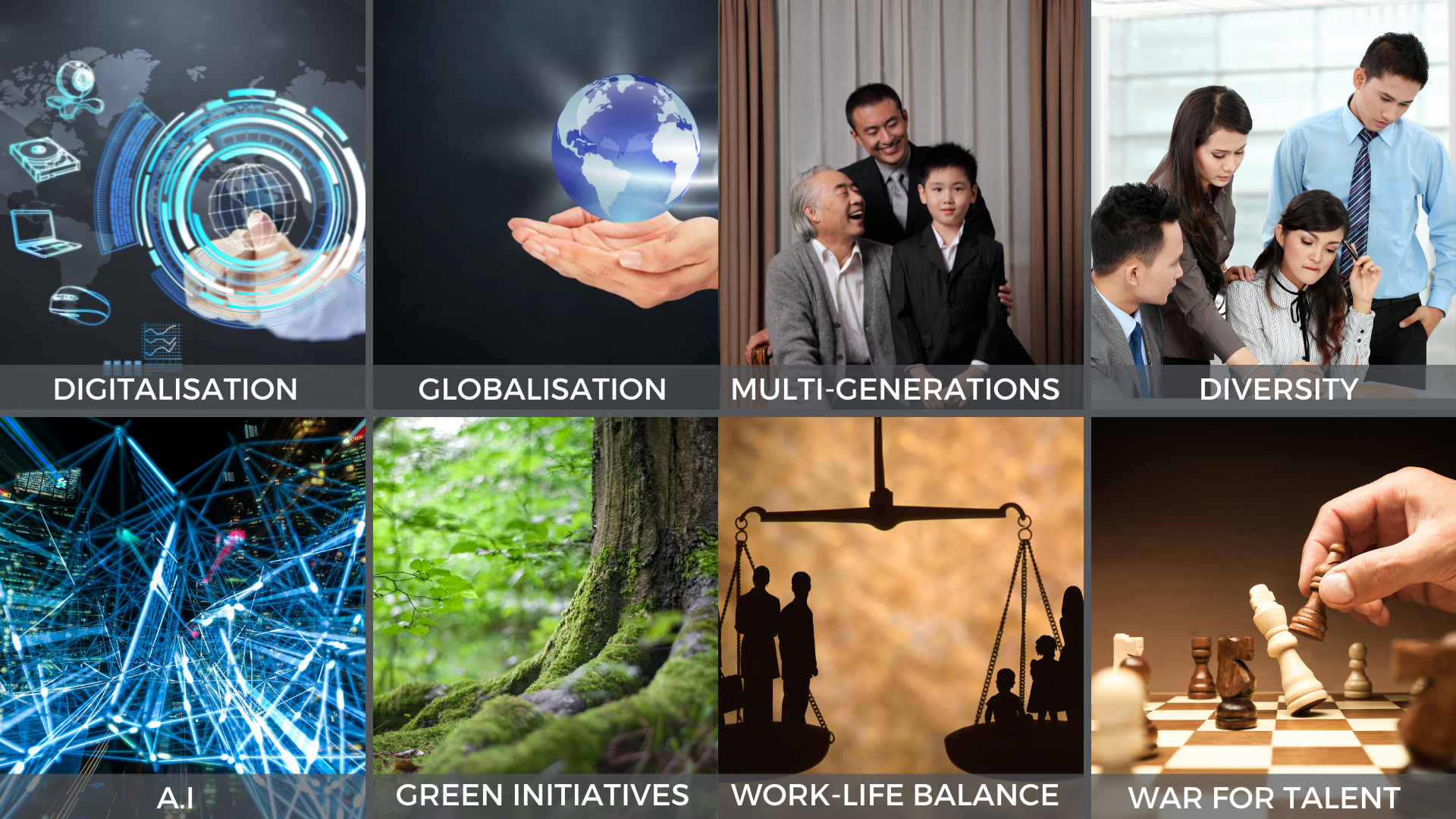
Let's talk leadership
Who makes the best leaders? Not ex-Mariners according to the survey data. Although 50% of those surveyed were ex-Mariners, 76% felt that they do not make the best leaders. This highlights the sheer difference between being a Senior Officer and a Senior Executive.
The traditional routes to being a Senior Maritime Executive are changing. As reported in our 2017 report "Maritime Executives, your thoughts", and confirmed once again in our 2019 survey, Senior Executives recognise that the environment on-board a vessel is unlike that of an office-based job. The hierarchical style of management traditionally used aboard vessels does not translate into commercial settings, where structures have typically become flatter and a more collaborative leadership style has developed and is now required.
We have to highlight the lack of experience of managing females aboard a vessel too, with only 4% of the Seafaring workforce being represented by females. How will those with a style focused on a male-dominated workforce transfer across to an environment where the industry is working hard to attract top female talent from both inside and outside the sector?
The lack of female Mariners and the past traditional route of the Seafarer to board executive have also had a huge impact on the lack of female representation in the boardroom. Times have to change.
The traits of our future Executives will not be created at sea unless new structured training from ship to shore is put in place which will encourage new ways of thinking. New generations are demanding paid study leave to achieve qualifications and career progression opportunities.
Younger generations are pushing a faster career life-cycle from ship to shore. With new needs and wants, they don't want to spend their whole career at sea.
Changing a Senior Officer’s style of management from ‘tell’ to ‘sell’ management, moving away from a systematic approach to new creative ways of thinking will have a huge impact on the future routes of talent to the Executive level.
The industry must improve on developing the skills of those at sea because the talent is there; it just needs nurturing. If it does not, Maritime will eventually lose that element of expertise at sea that it so heavily relies on ashore. Seafarers are the future and it is positive that the majority of industry executives can see the issue. They now need to act on it.
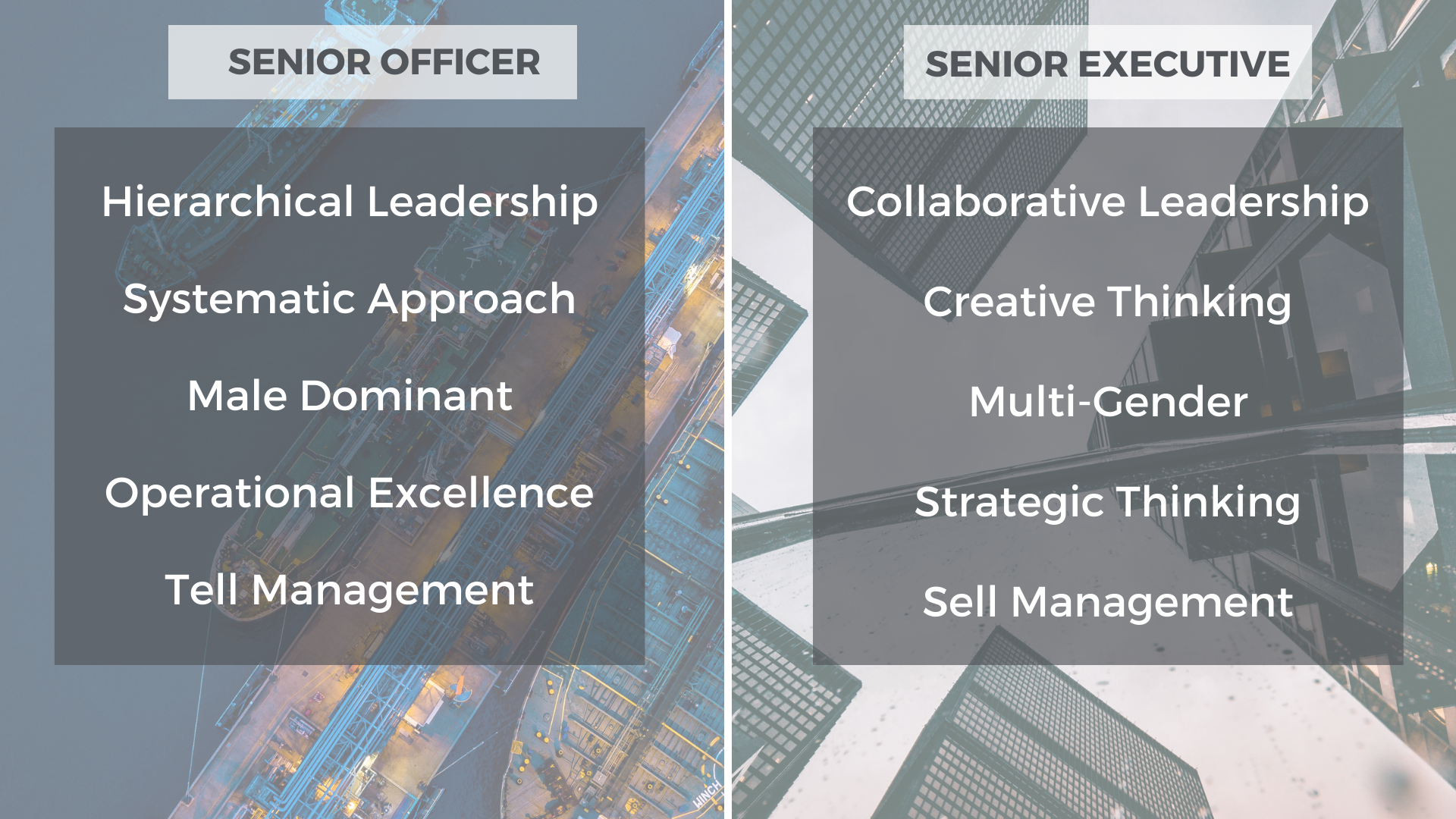
"We can see there are some big differences between being a Senior Officer at sea to being a Senior Executive in the boardroom," says Mark Charman.
Traditional versus new routes of talent
If all else fails, should Maritime look outside of the sector for Executive level talent? 76% of executives believe that Maritime should look to other sectors for Executive-level talent, but where will it come from? Faith in the future talent of the industry is progressively falling. We have seen a decrease of 5% in confidence in Maritime talent pools since our 2017 survey.

The usual suspects were suggested by Executives, including Finance, Energy, Oil & Gas, Technology, Aviation and Engineering to poach from. However, 67% of senior leaders think that Maritime does not pay enough to compete for talent from other sectors, and 68% said they thought pay in Maritime would be static for the next two years. How will the Maritime sector attract these new pools of talent?
"If you take the technology sector, for example, it is saturated with disruptive organisations who are offering new ways of working and competitive rates of pay. Perhaps instead of focussing on new talent pools, we should be looking at retaining the future talent that we have. We are in an alarming situation where static pay rises and non-competitive pay in our industry could create a situation where our top talent is being poached by other industries because of their perceived attractiveness."
The reality of the situation is that the maritime industry is not currently attractive enough to attract top talent from other sectors. The maritime industry knows there is a talent gap, and they want to use other sectors as a seemingly ‘quick fix’ to plug it.
"The truth is quite different. Our experience shows that Maritime businesses are reluctant to hire someone from a different vessel type, let alone someone from a different industry. Maritime hiring managers struggle to see transferrable skills in CVs from other sectors and it is rare that talent from the mentioned industries is even taken to the first interview stage. We still have not seen anyone taking the lead on hiring from outside the sector."
Future talent hubs
Maritime powerhouses London, Copenhagen and Hamburg were all in the fold as future talent hubs in our 2017 survey, with Singapore coming out on top, but two years later, do executives still feel the same about future talent hubs?
Aside from looking at internal and external industry talent pools, we asked Executives ‘which location do you think will hold the largest pool of Maritime talent over the next 5 years?’. We saw some huge growth in some locations since our 2017 survey, but also some locations fell in confidence.
Confidence in Hamburg and London as Talent Hubs has fallen by 33% over two years. Is this the BREXIT effect on London – with the UK’s future uncertain and with no decision in sight, is the perception that the UK is no longer focussing on investing in local talent? What effect will this have on the Maritime industry in the UK, and will other talent hubs reap the benefits with Brits migrating abroad?
"The issue with BREXIT for the UK is the uncertainty. Those living and working in the UK feel unsure about their futures, as do the businesses operating in it and working with them. Until a deal is done, the UK is at risk of being perceived as an uncertain location."
Hamburg has had a difficult time over the last two years with a decline in the Maritime industry in Germany as a whole. On top of that, tough Container and tough Dry Bulk sectors are making an investment in this part of the world challenging, and global Executives have taken note and have lost confidence in its ability to deliver a future talent hub.
Notably, Copenhagen has seen a significant increase in confidence since 2017 as a talent hub, an astonishing 100% increase. The Maritime sector is an important part of the Danish economy. Large shipping companies such as Maersk, DFDS Tor Line, Clipper Group, Thorco Shipping and Scan Group are clustered on the shoreline of Copenhagen and continue to bring confidence in the city as a Maritime talent hub.
"It is worth noting for other Maritime hubs that the significance of the Maritime industry on their country’s economy will affect the perception of Maritime Executives of their ability to deliver Maritime talent of the future. Succeed in Maritime as part of your economy, grow prosperous Maritime businesses and the talent will thrive and grow with it."
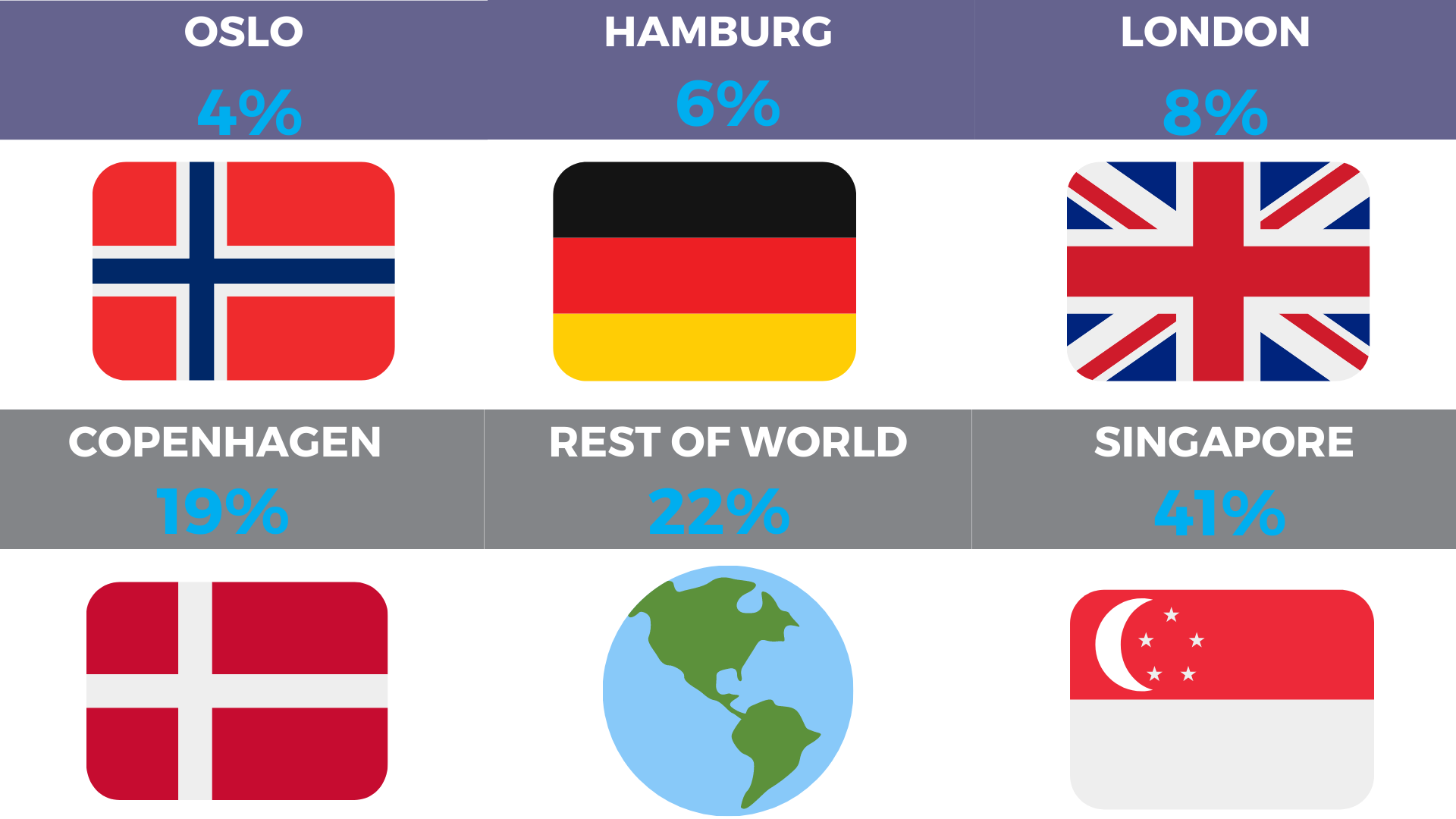
Singapore - Silicon Valley for Maritime?
Singapore was voted top as the hub for future Maritime talent, increasing its dominance since our 2017 survey. This did not come as a surprise to us, Singapore was once the place for Maritime businesses to house their regional headquarters in Asia, but now these offices are the global headquarters for many.
The Lion City did not just stumble on this good fortune, it has worked hard, and still does, to ensure it attracts and develops top talent in the Maritime industry.
Singapore has stayed focused and true to its vision of the future of Maritime. It has promoted a strong Maritime brand throughout the country and globally wide, continuously communicating and leaving no one in doubt of what they are trying to achieve. Their deliberate approach to talent has ensured it has attracted top businesses to move their offices and headquarters to the bright lights of Singapore away from some of the traditional maritime hubs, such as New York, London and Hamburg.
The attraction of top Maritime businesses has created a Maritime ready workforce, where building careers in these top businesses have become aspirational. It has opened up careers for Asian seafarers who have not been able to gain work easily in Europe or North America with the tightened Visa restrictions and preference for other nationalities.
Initiatives like Maritime Singapore Connect that was started in 2016 by the Maritime Port Authority of Singapore to elevate profiling efforts of the maritime industry, connect students and job seekers to maritime opportunities, and provide Singaporeans with easy access to maritime careers, education and training opportunities, has ensured that a Maritime career is something that is accessible to young people and those interested in a career in this industry.
Events like Singapore Maritime Week have become a must-attend event in the global Maritime calendar, attracting over 40,000 Maritime professionals from across the globe for this event every year. If you are in Maritime, you will be at Singapore Maritime Week.
"There is no doubt about it, Singapore is a fantastic place to live and work. Expatriates cite moving to Singapore to help progress their careers, to try a new challenge as well as find the country better for their children’s health and well-being. The country is safe, well-organised and with lush, vibrant surroundings and the great quality of life it offers natives and expatriates, we question why we are still living in Southampton, UK."
"Genius loves company" and it is certain that talent attracts talent in Singapore. When Faststream first started its business in Singapore, we found we were placing expatriates in Singapore for the first time. Today, we are either placing native Singaporeans or helping expatriates make their second or third career move within the country.
Silicon Valley became the talent magnet for technology and digital moguls in the 1990s, and we can’t help but foresee that Singapore will be the Silicon Valley for Maritime in the not too distant future.
How will future generations change the way we lead our business?
There is no doubt about it, new generations are moving into our Maritime workforce – there has been a lot of talk on Millennials in the press for the last few years but these individuals are already established in our businesses and Generation Z is here. It isn’t just new generations that are having an impact on the way that we lead, we have new faces from different industries joining the Maritime workforce as well as a push to attract female talent and new cultures to our teams.
We asked our global Maritime Executives whether they thought that new generations would need a different style of leadership, and the unequivocal answer was yes, with 88% citing that they would need a new leadership style. We were pleasantly surprised that equally, 88% believed they possessed these skills to lead the new Maritime workforce.
Responses to the question "What skills do you think you need to lead the next generation of talent?" fell into two camps; Technology skills and People skills.
Technology skills
Maritime Executives are seeing the value in investing in knowledge of technological advancements as part of leading new generations, even citing Social Media as something they should excel and lead on.
"Investing time and energy into my knowledge of Social Media and its impact on the industry and my workforce is an important part of my personal growth – I want to be where the new generations are, seeing what they are seeing, and incorporating it as part of my work-self."
Other Executives quoted that "Keeping up to date with digitalisation is paramount to being at the forefront of the industry and having the knowledge and skills to lead new talent coming in with these specialist skills."
But it wasn’t just technology that was acknowledged as an important part of leading future generations, softer, people skills were voiced highly too.
People skills
Possessing the right people skills is fundamental to the success of leadership, having the ability to relate to others no matter what generation, culture or industry they are from, could be a huge advantage in gaining the buy-in of a workforce. There were many soft skills expressed by Executives as important to leading new generations of talent; "Knowing how and when to show empathy towards my team", "Developing patience and stronger, less authoritative communication skills", "Showing trust in my team and offering better work-life balance." as well as "Offer support, sympathy and feedback in my daily business life."
These show some big changes from the traditional leadership styles that we have previously seen in the Maritime boardroom and beyond. Executives are either paying lip service to what they think needs to be delivered, or they are working towards a revolution of change in leadership styles for the future.
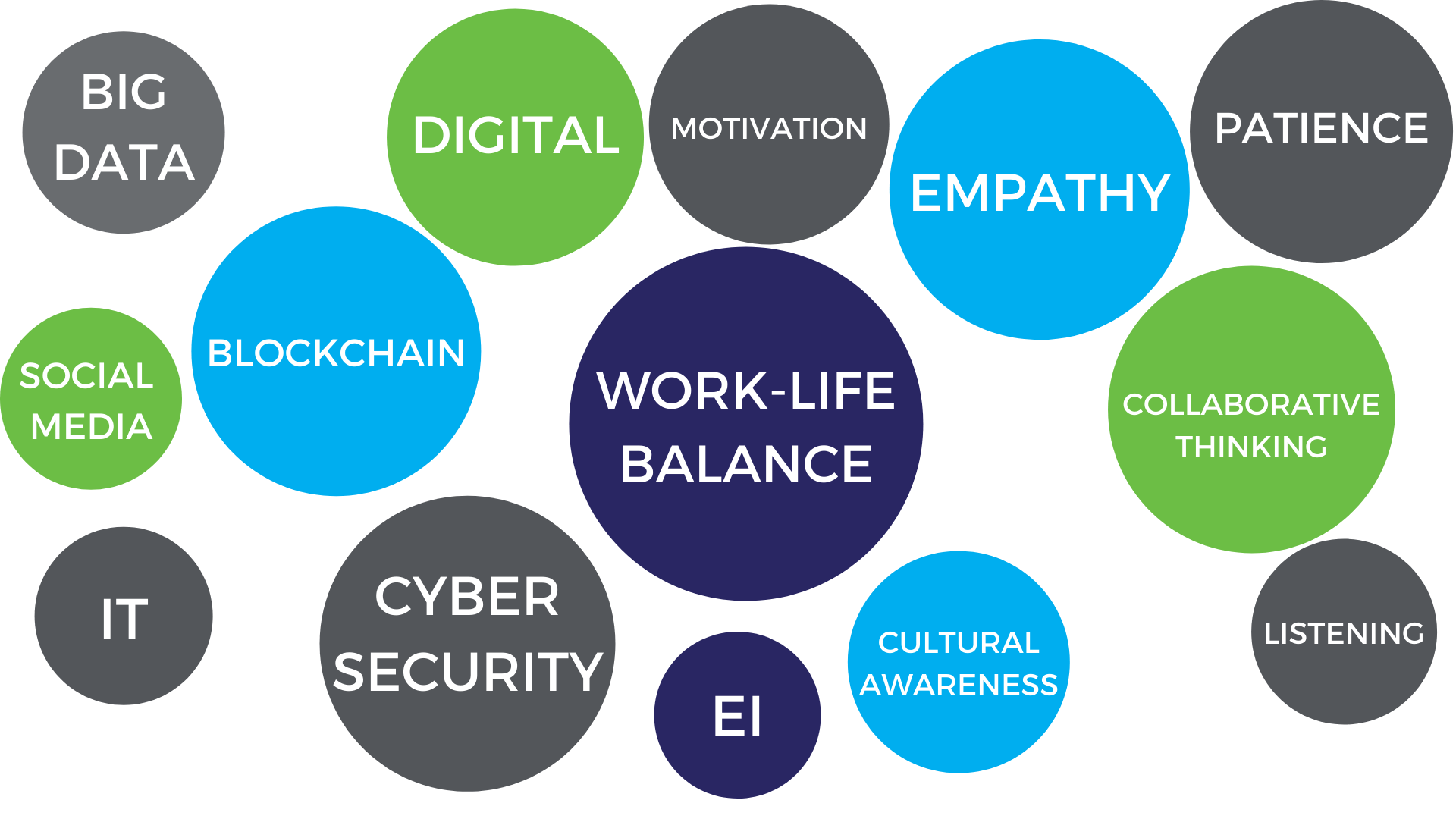
Executives versus Employees - what do they really want?
Do we know what our employees want, and what factors will have the most significant positive impact on their work-life and our businesses? We put the question to Executives "If you improved one factor for your employees, which one would have the most positive impact on your business?" We then asked Executives to rate from a number of factors "What matters most to you at work?" The results were astonishing.
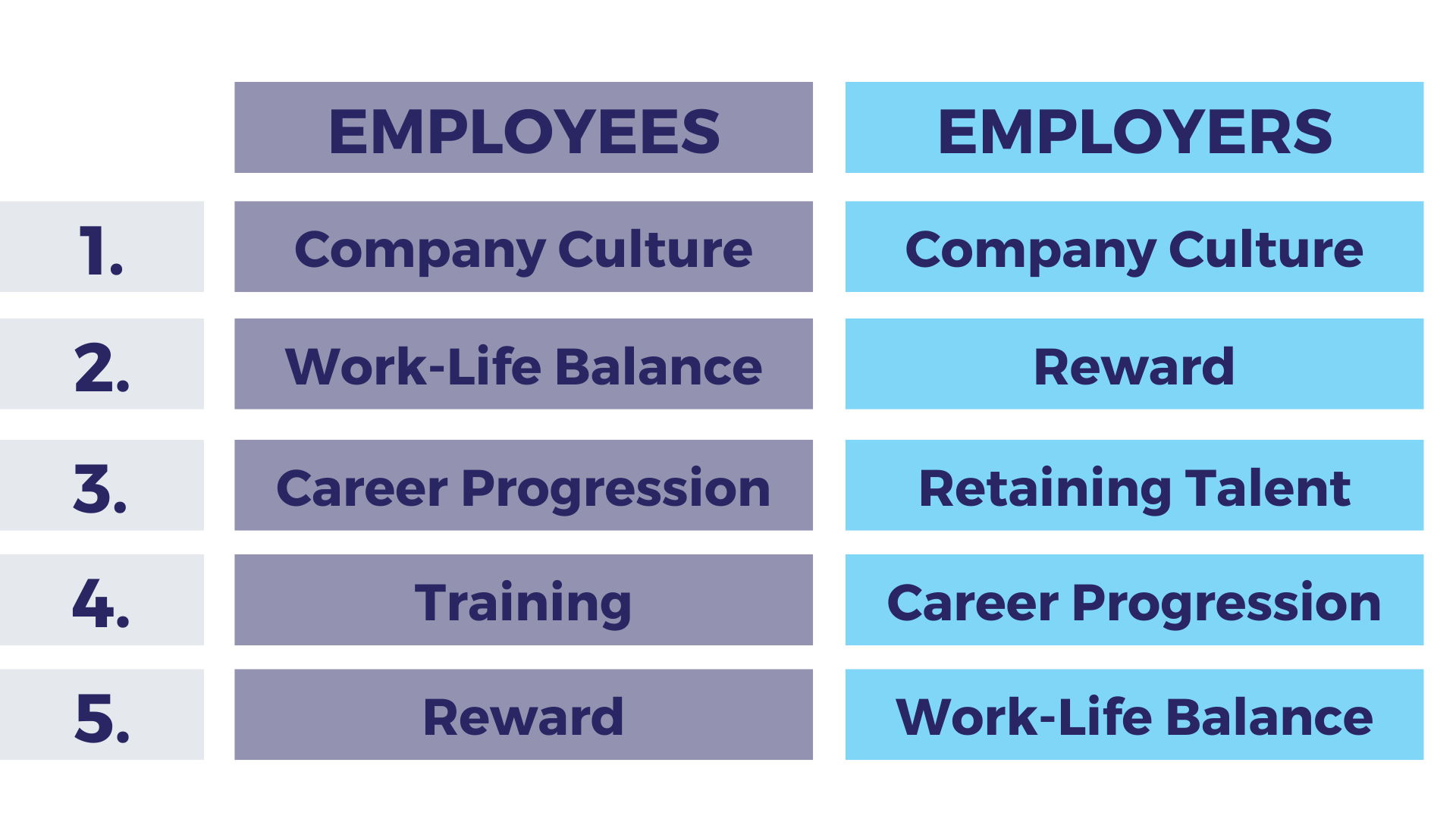
It is clear that Executives believe that developing a better Company Culture is fundamental to the future success of their businesses, their employees and themselves. Often described as the personality of a company and how it defines the environment in which employees work, it also includes a variety of elements, including company mission, values, ethics, expectations, and goals.
Top Maritime Executives are clearly recognising the fundamental impact of Company Culture on the success of their business and how it complements the people skills that were highlighted in their new approaches to leadership for new generations. Executives are recognising and striving to make positive changes in their businesses – this is a huge driver for the vision of ‘The Changing Face of Maritime’
The subject of Work-Life Balance is a contemporary topic and is set from the top down. With Executives not rating this as important to themselves but highlighting it as a high priority for their employees, how will they lead a positive change? It is ingrained in us to look to the top to set the precedent of how a company works, and if Executives cannot show their ability to balance their work with life and set the example, where will the buy-in come from? It is an age-old tradition for middle management to imitate the example set from the top rank – if you are emailing late at night and at the weekends, your personnel will too – this is not Work-Life Balance. It is a simple case of ‘practice what you preach’.
There was a disconnect between Executives rating Reward as their second top priority for themselves but not recognised as important for their employees. Why do Executives rate this as a top priority for themselves but not for their employees – is there a misconception that employees cannot be motivated by money, but Executives can? We see this as an unpopular message from the top down and could be construed as ill-considered and create animosity amongst a workforce.
Do we really know what employees want? Or should we just pay them more?
Disruptive technology in Maritime
Maritime software and digitalisation continue to be hot topics for Senior Maritime professionals, and Shipping and Maritime businesses have recognised the benefits of investing in faster connectivity and improved digital operations. Current talk of big data and A.I continue to hit the headlines and leaders are seeking advice and guidance from digital experts on how to lead the charge in the Maritime digital revolution.
We asked Executives "Is the Maritime sector ready for A.I?" A resounding 66% said no. Why are Executives feeling averse to this important technological change in the industry? We believe there is simply a lack of understanding in the market as well as a level of uncertainty. In many industries, it is difficult to envisage what impacts A.I will have and in combination with a lack of understanding, it is hard to know whether the industry is ready or not. A Maritime Executive will need to be the first innovator in this technology in the industry, but how quickly other early adopters will be is hard to say. The Maritime industry has had a reputation of falling into the laggard camp – often being one of the last to adopt technologies, but could A.I break the norm? 34% believe the industry is ready and this could potentially be enough to push Maritime into the digital revolution.
Over 60% of Executives did not believe that the continued digitalisation of the Maritime industry would enable the reduction of the years of seafaring experience required for senior shore-based positions. Is this again a lack of understanding of new technologies and how it could have the potential to speed up career progression? Do Executives truly believe it won’t reduce the years of seafaring years required or do they simply not want it to? Ex-Mariners themselves could be guilty of believing that other Mariners should put in the years they had to and believe the traditional route is the right route. We have already made reference that Maritime needs to push forward and ex-Mariners might simply have to start accepting that the traditional route just doesn’t work for the industry anymore.
Executives seem to be happy to embrace digitalisation to a point, but when it starts to move into a territory that they lack understanding or it changes the traditional route of talent, the majority of Executives just can’t embrace it. There still appears to be a more negative perception of technology’s validity and scope for the future in the industry.
Life in the Maritime boardroom
In a time of unprecedented change in Maritime, Executives are feeling the pressure and are suffering from their own job security issues. We asked Executives "In the last 2 years have you worried about your job security?", a staggering 1 in 2 Executives confirmed that they had been concerned. The knock-on effect of concerns over job security is that there is the potential that employees will act differently and this is significant when it is those who are responsible for leading the business.
More concerning was that when we asked if Executives were planning to change jobs, over 65% responded that they are either planning or considering changing jobs in the next two years. And 1 in 5 Executives said they would leave the sector if they could when questioned.
"With our recruitment hats on, our immediate reaction is movement at the top is a positive move for us, with more organisations needing to source the best talent in the Maritime industry. In reality for the businesses themselves, it will create considerable pressure to hire experienced and reliable talent. This could create a turbulent industry, with much unrest at the top, and the potential to affect the Maritime industry moving forward. We can all take some change, but could the industry as a whole, deal with huge movement at the top?"
Despite the feeling of unrest in Maritime leaders, over 80% would still recommend a career in Maritime to young people. So, although 1 in 5 would leave if they could, the remaining 80% are still advocates for the industry.
Follow Fastsream Recruitment on LinkedIn, Facebook and Twitter for the very latest updates, and exclusive insights.





